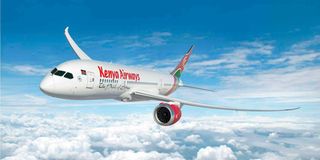KQ secures three Gatwick landing slots in revenue growth plan

Kenya Airways Boeing 787-8 Dreamliner aircraft as seen on final approach landing at London Heathrow International Airport in England, UK, on October 20, 2019.
National carrier Kenya Airways (KQ) has secured three weekly landing slots at London’s Gatwick Airport as part of a strategy of expanding its business on the key route that currently stands as the airline’s most profitable international route.
The new slots will support three direct flights from Nairobi to Gatwick operating every Wednesday, Friday, and Sunday, which complements the national carrier’s daily service to London Heathrow.
A landing slot refers to a specific time frame granted to an airline by an airport authority to land or take off. These slots mostly influence an airline’s revenue potential and competitiveness, especially at high-traffic airports where the capacity is limited.
Julius Thairu, KQ’s Chief Commercial and Customer Officer, said the addition of the Gatwick route fits into the airline’s broader expansion goals.
“London remains one of our most profitable routes and a route that meets international needs. We fly seven times weekly to Heathrow, and we’re almost full year-round. But Heathrow has limitations with landing slots, so we are not able to actually increase our frequencies,” said Mr Thairu.
According to Mr Thairu, the London market alone contributes over 10 per cent of the airline’s total turnover. The new second London gateway is expected to boost the turnover with the addition of 700 additional weekly seats into the UK market.
In 2016, KQ sold its 5.30am Heathrow arrival slot to Oman Air for about Sh5.3 billion. The early morning slots tend to be valuable to airlines due to passenger demand, which can fall by up to 50 per cent by evening, giving such time windows premium status among global carriers.
Heathrow now stands with one landing slot daily for KQ.
The Gatwick route is projected to break even within the first year—faster than other international launches such as the New York JFK route, which, according to Mr Thairu, took about three years to become profitable.
The shift to Gatwick also comes against the backdrop of operational constraints at Heathrow where the airline says obtaining additional landing rights has become costly.
“There are a few slots left [at Heathrow], but you have to cough out hundreds of millions of dollars to buy those slots and I don’t think that makes business sense,” Mr Thairu added.
KQ Group CEO Allan Kilavuka said the new capacity will have immense flexibility for both leisure and business travellers, which will enhance their cargo and passenger efficiency. “This gives our passengers choice and flexibility, whether they are travelling for business, or whether they are travelling for tourism, education, or connecting to friends and family in the UK,” he said.
Mr Kilavuka added that the route strengthens Kenya’s positioning as a regional aviation hub by improving the connectivity for travellers transiting through Nairobi from cities such as Kigali, Mombasa, Zanzibar, and Johannesburg. “This is not just a commercial venture. It positions Nairobi as a continental aviation hub of choice and also connects more people from around Africa through Nairobi to Gatwick and to the rest of the UK and Europe,” he said.
When it comes to the logistics the national carrier projects a 40 percent increase in vending capacity into the UK through Gatwick, citing the airport’s lower congestion levels as a competitive advantage. “Gatwick is also renowned for cargo efficiency. It’s less congested, and therefore, even for travellers, it’s more convenient,” Mr Kilavuka added.
Mr Thairu further noted that the passenger segment for the Gatwick route is comprised of about 70 per cent leisure and 30 per cent business travellers, with a growing student segment in focus.
He admits that British Airways is KQ’s main rival in the London market, despite not operating out of Gatwick. “They fly non-stop into Kenya, so they remain competitors, but they don’t fly to Gatwick. When I look at the other African carriers, they are still our competitors. However, the UK market demand is still strong. I don’t see any of the other carriers struggling,” he said.
The Gatwick service is currently operated using KQ’s long-haul night fleet, although the management says the airline is constrained by the increasing frequencies due to the limited aircraft availability.
The latest Annual Tourism Sector Performance Report 2024 by Kenya’s Tourism Research Institute shows that international arrivals rose to 2.394 million, with the UK being Kenya’s top five source markets. On trade, the UK–Kenya Trade and Investment released in June 2025 by the UK government shows that the total bilateral trade hit Sh318 billion (£1.8 billion) in 2024, with UK imports from Kenya growing by 8.1 per cent.


